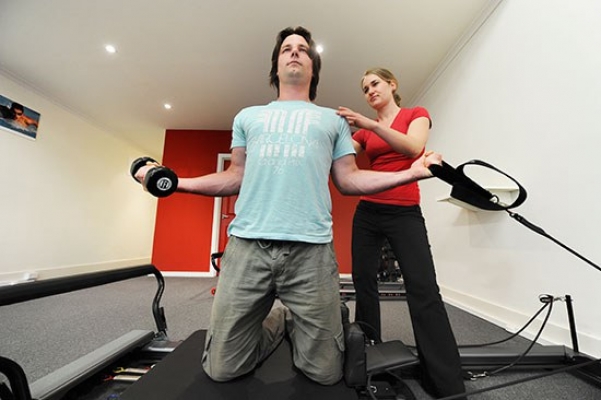Clinical Pilates offers essentially the same benefits to men as it does for women. Everybody can benefit from a good Pilates regime. The training can be personalised, focusing on areas that are most important to each individual. From strength and power, to flexibility and coordination, the sky is the limit. That said, we’ve compiled a list of benefits which many men may not have considered and could spark some interest in giving Clinical Pilates a go.
Focus on neglected areas
A respectable Clinical Pilates program will generally begin with a thorough assessment, usually conducted by a physiotherapist. This will help bring to light any specific areas of weakness you may have. Whether you are rehabilitating an injury, managing a chronic condition or wanting to improve your athletic performance, your program will help patch up those “holes” in your armour.
Improves your posture and core strength
Posture is a problem area for many men, especially for those who have sedentary jobs. Clinical Pilates helps to improve your posture through specific exercises. Since the program is carried out by physiotherapists they will also discuss correct ergonomics with you. This will help you maintain correct posture while at work.
Core strength is also a very important area for men, particularly those who have manual jobs. When your core muscles are weak back pain is a common result. Physiotherapists use Real Time Ultrasound to assess the strength and control of the core muscles. This ensures that correct activation of those muscles is achieved during exercises. With time you will be engaging those muscles automatically whenever they are needed, i.e. when performing manual tasks at work.
Compliments other training
Each individual will have a preference for what type of exercise they prefer to partake in. Some people tend to stick to team sports; others prefer to lift weights in the gym, while others are more inclined to go for a run. Whatever your preferences and goals are, a good Clinical Pilates program can help fill in the gaps, ensuring that you are in the best shape possible to continue with your preferred forms of exercise. You may even find that Pilates creeps up to the top of your list!
Improves flexibility
While this is a broad generalisation, typically men are less flexible than women. As we age, this becomes even more pronounced, with our joints becoming stiffer and annoying aches becoming more prevalent. Pilates is a great way to improve your general flexibility, challenging your body in a safe and structure manner. If you have particular areas that are bothersome, your physiotherapist/ instructor can help work through these to maximise your results.
Helps the mind
With the pace of life continuing to increase, the yoga/meditation/mindfulness movement has become a popular trend as of late, in an attempt to ground ourselves and combat the stresses of daily life. Pilates shares many characteristics with these practices, as Pilates exercises are intended to be performed in a very controlled and coordinated manner. This means that a high focus is placed on feeling each movement and listening to your body as you exercise. Additionally, there is a strong focus on breathing, with more advanced exercises integrating complex movements with controlled breathing techniques. In all, this can help you relax and reduce stress, feeling more refreshed.
Improves the pelvic floor
Much like women, men can also experience men’s health issues. These include testicular and prostate cancers, as well as impotence, to name just a few. With a sound understanding of anatomy and pathophysiology, physiotherapists can help improve the function and strength of the pelvic floor, especially post-surgically where issues can arise without a thorough rehabilitation. Real Time Ultrasound helps to make sure that you are achieving correct activation of the pelvic floor muscles.
So there you have it. Just a few reasons why men should consider undertaking Clinical Pilates as either a complement to, or the main part of their physical activity profile.

